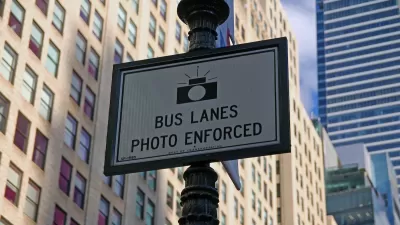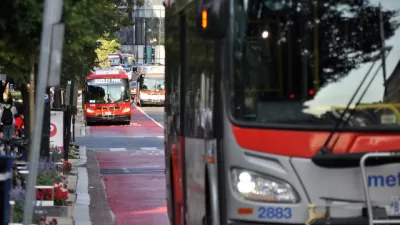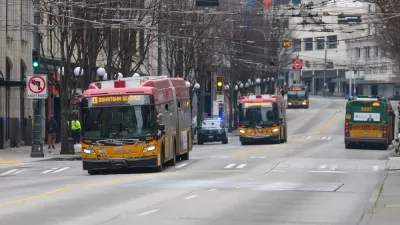The city hopes to improve the speed of its notoriously slow buses by using traffic cameras to ticket drivers who drive or park in dedicated bus lanes.

“Despite New York’s 140 miles of dedicated bus lanes, other large U.S. cities put it to shame when it comes to average bus speed,” writes Danielle Muoio Dunn in Politico, with some buses clocking in at half the average speed of other major cities. “Despite having dedicated access, vehicles parked in bus lanes continue to mar the city’s efforts to dramatically improve speeds and service reliability.”
Now, the city plans to use traffic cameras to issue citations for the notoriously common practice of blocking bus lanes. “During a 20-minute ride along the entire 42nd Street bus lane on a Thursday afternoon in August, POLITICO counted 11 vehicles idling or parked in the busway — including a UPS truck, taxis and SUVs and a commercial delivery van. One car used the bus lane to cut ahead of the gridlock traffic in Times Square, temporarily blocking access as it attempted to merge back into the crowded lane.”
After convening at a Transit Improvement Summit, transit officials committed to installing 50 additional cameras in bus lanes. “Meanwhile, the MTA recently awarded a contract to California tech startup Hayden AI to mount 300 more cameras on buses — bringing its automated enforcement program to 473 buses by the end of this year.” In 2021, the camera program captured more than 600,000 violations.
The article notes that “The tickets have an impact. Less than 20 percent of drivers who are issued a bus lane violation go on to commit another, according to the MTA, which started tracking the data in 2019 when it began mounting cameras on buses. Only 8 percent of motorists have gone on to commit more than two violations.”
FULL STORY: Can camera enforcement speed up New York's sluggish buses?

Maui's Vacation Rental Debate Turns Ugly
Verbal attacks, misinformation campaigns and fistfights plague a high-stakes debate to convert thousands of vacation rentals into long-term housing.

Planetizen Federal Action Tracker
A weekly monitor of how Trump’s orders and actions are impacting planners and planning in America.

Chicago’s Ghost Rails
Just beneath the surface of the modern city lie the remnants of its expansive early 20th-century streetcar system.

Bend, Oregon Zoning Reforms Prioritize Small-Scale Housing
The city altered its zoning code to allow multi-family housing and eliminated parking mandates citywide.

Amtrak Cutting Jobs, Funding to High-Speed Rail
The agency plans to cut 10 percent of its workforce and has confirmed it will not fund new high-speed rail projects.

LA Denies Basic Services to Unhoused Residents
The city has repeatedly failed to respond to requests for trash pickup at encampment sites, and eliminated a program that provided mobile showers and toilets.
Urban Design for Planners 1: Software Tools
This six-course series explores essential urban design concepts using open source software and equips planners with the tools they need to participate fully in the urban design process.
Planning for Universal Design
Learn the tools for implementing Universal Design in planning regulations.
planning NEXT
Appalachian Highlands Housing Partners
Mpact (founded as Rail~Volution)
City of Camden Redevelopment Agency
City of Astoria
City of Portland
City of Laramie





























